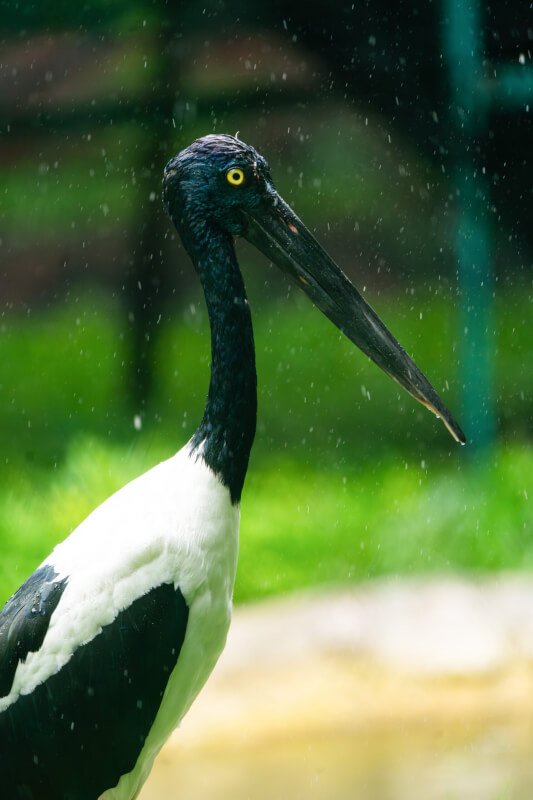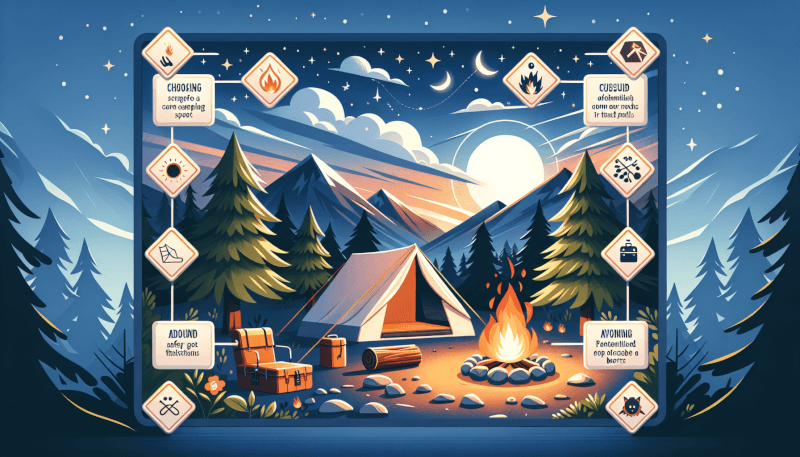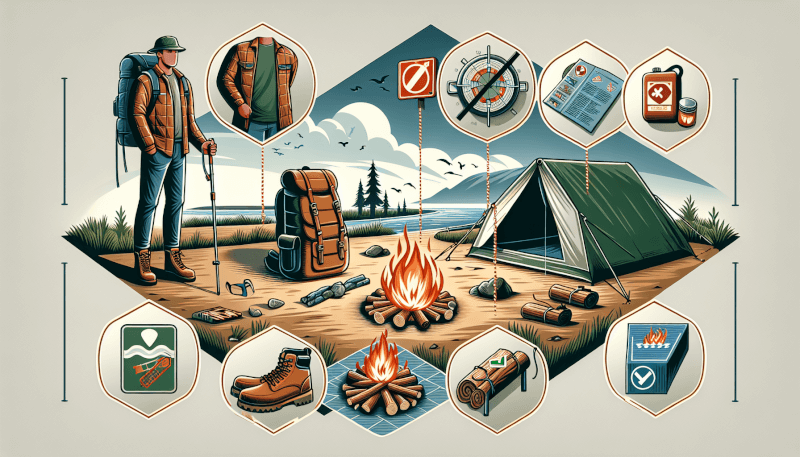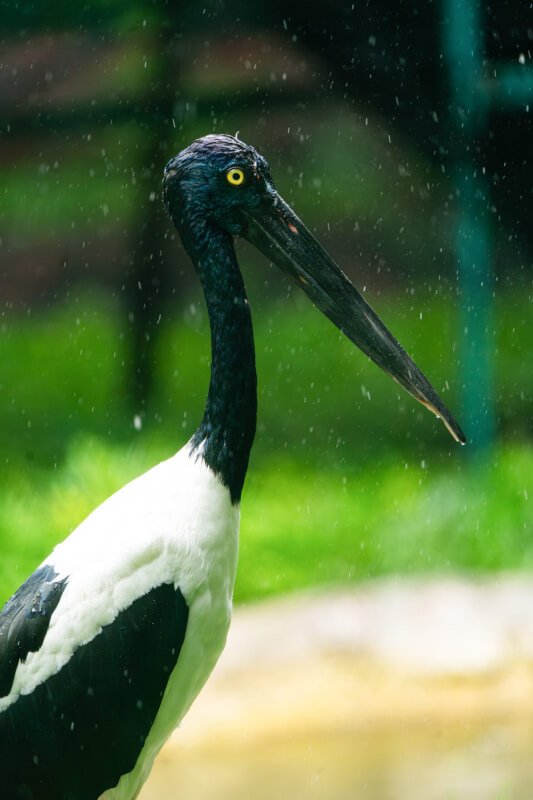Imagine yourself surrounded by nature, with the cool breeze gently rustling the leaves of the trees, and the sound of birds singing in the distance. Ah, the joy of camping! But amidst all the adventure and beauty, it’s important to prioritize your safety. In this article, we will explore the top ways to stay safe while camping, ensuring that you can fully enjoy the wonders of the great outdoors without any worries or concerns. From choosing the perfect campsite to packing the essential safety gear, let’s embark on a journey to ensure your camping experience is both enjoyable and secure.

Choosing a Campsite
Consider the location
When choosing a campsite, it is important to consider the location carefully. Think about what kind of environment you prefer – do you enjoy being near a lake, in the mountains, or surrounded by forests? Take into account the activities you plan to do while camping, such as hiking or fishing, and choose a location that offers easy access to those activities. Additionally, think about the distance from civilization and whether you prefer a remote site or one that is more easily accessible.
Check for potential hazards
Before setting up camp, it is crucial to check for potential hazards in the chosen campsite. Look for any unstable trees or branches that could potentially fall and cause harm. Be aware of any nearby bodies of water and assess the risk of flooding or flash floods. If camping in an area known for its wildlife, research whether there have been recent sightings of dangerous animals and take the necessary precautions.
Look for accessibility
When selecting a campsite, it is essential to consider accessibility. If you have any mobility issues or are bringing along someone who does, ensure that the chosen campsite is accessible for everyone. Look for level ground and check if there are any nearby amenities, such as restrooms or water sources, that would make your camping experience more convenient.
Preparing for the Trip
Research the area
Before heading out on your camping trip, take the time to research the area you will be visiting. Familiarize yourself with the local regulations and any permits that may be required. Research hiking trails and attractions nearby, so you can plan your activities accordingly. Being well-prepared and knowledgeable about the area will enhance your camping experience.
Check the weather forecast
Checking the weather forecast before your trip is crucial for planning and staying safe. Depending on the weather conditions, you may need to adjust your packing list and plan for potential changes in outdoor activities. Keep an eye out for any severe weather alerts that could make your camping trip potentially dangerous. It’s always better to be prepared for any weather changes that may occur.
Pack essentials
When preparing for your camping trip, ensure you pack all the essential items. This includes having a tent, sleeping bag, and camping stove to allow for shelter and cooking. Pack enough food, water, and cooking equipment to last throughout your trip. Don’t forget to bring proper clothing, first aid supplies, and navigation tools. It’s always better to have everything you need with you, rather than realizing you forgot something essential once you are already at the campsite.
Inform others
Before embarking on your camping adventure, it is important to inform someone about your trip details. Share your planned itinerary, including the campsite location and duration of your stay, with a trusted family member or friend. This way, if anything unexpected occurs, someone will know where to find you and when to expect you back. It’s better to have someone aware of your plans just in case of emergencies or unforeseen circumstances.
Plan for emergencies
No matter how well you prepare, emergencies can still happen. Be sure to have a plan in place for emergencies before your camping trip. Familiarize yourself with the location of the nearest hospital or medical facility and keep emergency contact numbers readily available. Additionally, consider taking a first aid and CPR course to be prepared for any medical emergencies that may occur while you are in the outdoors.

Setting Up Your Campsite
Find a level and secure spot
Once you arrive at your chosen campsite, take the time to find a level and secure spot to set up your camp. A level site will make sleeping more comfortable and prevent any discomfort during the night. Look for a spot that is free from rocks, root systems, and debris that could make your camping experience less enjoyable. Additionally, ensure that your site is well-drained to avoid any issues with precipitation.
Clear the area
Before setting up camp, it is important to clear the area of any debris or hazards. Remove any branches or rocks that could potentially cause injury. Be aware of poison ivy or other harmful vegetation and make sure to avoid setting up camp near them. By clearing the area, you not only provide a safer environment for yourself and others but also contribute to leaving a minimal impact on the campsite’s natural surroundings.
Set up a safe fire pit
If you plan on having a campfire, it is crucial to set up a safe fire pit. Look for a suitable location away from any overhanging branches or flammable materials. Clear a circle of ground and surround it with rocks to create a contained area for your fire. Always keep a bucket of water nearby to extinguish the fire if necessary. Remember to adhere to any local regulations regarding campfire restrictions and never leave the fire unattended.
Store food properly
Properly storing food is essential when camping to prevent wildlife encounters and ensure your safety. Invest in bear-resistant containers or hang your food from a tree branch to keep it out of reach of animals. Make sure to dispose of any food waste properly, either by bagging it and taking it out with you or by using designated waste disposal areas provided by the campsite. Proper food storage not only protects you from wildlife but also helps maintain the campsite’s ecosystem.
Campfire Safety
Follow local regulations
When it comes to campfire safety, it is critical to follow local regulations and guidelines. Some areas may have restrictions on open fires due to the risk of wildfires, while others may allow fires under certain circumstances. Familiarize yourself with the regulations in the area you are camping in and adhere to them to prevent any accidents or fines.
Keep a safe distance
While enjoying your campfire, always remember to keep a safe distance from the flames. Situate yourself and your camping equipment at a reasonable distance to prevent accidental burns or injuries. Additionally, avoid placing anything flammable, such as tents or chairs, too close to the fire. By maintaining a safe distance, you can prevent accidents and ensure a pleasant camping experience.
Never leave the fire unattended
One of the most important safety precautions when having a campfire is to never leave it unattended. Always have at least one person responsible for watching the fire while others are present. This will help ensure that any sparks or embers are promptly addressed and that the fire remains under control. It’s best to have a designated responsible person to prevent accidents and mitigate any risks.
Extinguish the fire completely
Before leaving your campsite or going to sleep, it is crucial to extinguish the fire completely. Pour water or dirt over the fire, mix it thoroughly, and repeat the process until the fire is entirely out. This will prevent any remaining embers from reigniting and potentially causing a wildfire. Always ensure that the fire is completely extinguished before leaving your campsite, as wildfires can be devastating to both the environment and human life.

Wildlife Awareness
Secure food and garbage
To protect both yourself and wildlife, it is essential to secure your food and garbage. Keep all food inside bear-resistant containers or in your vehicle, if allowed. Avoid leaving any food or food waste unattended at your campsite, as it can attract animals searching for an easy meal. By securing your food and garbage, you minimize the risk of dangerous wildlife encounters and help maintain a healthy ecosystem.
Use bear-resistant containers
In areas known for bear activity, it is recommended to use bear-resistant containers for storing your food and scented items. These containers are designed to make it difficult for bears to access the contents, preventing potential conflicts between campers and wildlife. Always follow the proper guidelines for using bear-resistant containers and store them a safe distance from your campsite.
Avoid feeding wildlife
Although it may be tempting to feed wildlife for a closer encounter, it is crucial to resist this urge. Feeding wildlife disrupts their natural behavior and can create dependency on human food, which can lead to potentially dangerous encounters. Instead, enjoy observing wildlife from a distance and appreciate their natural behaviors in their own environment.
Know how to react in encounters
In the event of a wildlife encounter, it is important to know how to react. Remain calm and do not approach the animal. Make yourself look larger by raising your arms or holding a jacket over your head. Back away slowly, giving the animal a clear escape route. In the case of a bear encounter, make loud noises and try to scare it away. Knowing how to react and having a basic understanding of wildlife behavior can help keep you safe during encounters.
Water Safety
Choose safe water sources
When camping near water sources, it is essential to choose safe options for drinking and cooking. If the water is not from a reliable source, such as a tap or a well, it is important to treat or filter it to remove any potential contaminants. Boiling the water for at least one minute or using water purification tablets are common methods for ensuring the water’s safety. Proper selection and treatment of water prevent waterborne illnesses and keep you hydrated on your camping trip.
Treat or filter the water
If you are unsure about the quality of the water at your campsite, treating or filtering the water is a necessary step to stay safe. Water treatment methods, such as using water filters or purifiers, can remove harmful bacteria, parasites, and viruses. Another option is to use water purification tablets or drops to kill any microorganisms. By taking precautions to treat or filter the water, you can protect yourself from waterborne diseases and ensure a safe drinking supply.
Practice good hygiene
Maintaining good hygiene while camping is essential to prevent the spread of germs and illnesses. Wash your hands frequently, especially before handling food or after using the restroom. Use biodegradable soap and a water container to wash your hands and face. If running water is not available, use alcohol-based hand sanitizer to keep your hands clean. By practicing good hygiene, you can reduce the risk of contracting illnesses and keep yourself healthy during your camping trip.

Hiking and Exploring
Stay on marked trails
When hiking and exploring the nature around your campsite, it is important to stay on marked trails. These trails are designed to ensure your safety and protect the natural environment. Straying off the established paths can lead to getting lost, encountering dangerous terrain, or damaging delicate vegetation. By sticking to marked trails, you can fully enjoy your outdoor experience while minimizing the risks associated with exploring unfamiliar territory.
Bring maps and navigation tools
Before going on hikes or exploring the area, it is crucial to bring maps and navigation tools. These resources will help you stay on track, find your way back, and avoid getting lost. Familiarize yourself with the map and take note of landmarks or specific features that will aid your navigation. By being prepared with the necessary tools, you can confidently explore your surroundings and avoid potential hazards.
Wear appropriate clothing and footwear
When exploring the outdoors, wearing appropriate clothing and footwear is crucial for your safety and comfort. Dress in layers, so you can adjust your clothing as the weather changes throughout the day. Wear sturdy and comfortable hiking boots or shoes that provide proper support and traction. Consider the weather forecast and pack a waterproof jacket or hat to protect yourself from rain or sun exposure. By wearing suitable attire, you can prevent injuries, stay comfortable, and fully enjoy your outdoor activities.
Buddy system
When hiking or engaging in outdoor activities, it is advisable to use the buddy system. Pair up with another person and stay together throughout your hike or exploration. Having a buddy ensures that you have someone to rely on in case of emergencies and enhances your overall safety. Communicate your plans with your buddy, stay within sight and earshot of each other, and be aware of one another’s well-being. The buddy system provides an extra layer of protection and a sense of security when venturing into the wilderness.
Weather Protection
Pack appropriate clothing
When camping, it is important to pack appropriate clothing to protect yourself from the elements. Pack clothing suitable for the expected weather conditions, including warm layers for colder nights and rain gear for wet weather. Choose materials that dry quickly and offer insulation, even when wet. By being prepared with the right clothing, you can stay comfortable and protected from any weather changes that may occur.
Use sunscreen and bug repellent
When spending time outdoors, it is crucial to protect your skin from the sun’s harmful rays and prevent insect bites. Apply sunscreen with a high SPF to all exposed skin, even on cloudy days, and reapply regularly. Use bug repellent to ward off mosquitoes and other insects, especially in areas known for carrying diseases such as Lyme disease or West Nile virus. By using sunscreen and bug repellent, you can protect yourself from sunburns and insect-borne illnesses.
Be aware of lightning risks
During thunderstorms, being aware of lightning risks is essential for your safety. If you hear thunder or see lightning, it is best to seek shelter immediately. Avoid open areas, tall objects, and bodies of water, as they can attract lightning strikes. Take refuge in a substantial, enclosed structure or in your vehicle until the storm passes. By being aware of lightning risks and taking necessary precautions, you can minimize the danger of being struck by lightning while camping.

First Aid and Emergency Preparedness
Carry a fully stocked first aid kit
When camping, it is crucial to carry a fully stocked first aid kit to handle any minor injuries or accidents that may occur. Your first aid kit should include items such as adhesive bandages, gauze pads, antiseptic wipes, tweezers, and pain relievers. Additionally, consider including any personal medications or specific items for pre-existing medical conditions. By having a well-equipped first aid kit, you can promptly and effectively address any medical situations that arise during your camping trip.
Learn basic first aid skills
Alongside carrying a first aid kit, it is important to have basic first aid skills to respond to emergencies effectively. Consider taking a first aid and CPR course to learn how to administer CPR, treat wounds, and manage other common camping injuries. Being knowledgeable in first aid can make a significant difference in handling emergencies and potentially saving lives. Stay prepared by refreshing your first aid skills regularly and staying updated with the latest techniques and procedures.
Know emergency contact numbers
Before heading out on your camping trip, it is essential to know the emergency contact numbers for the area you will be visiting. Familiarize yourself with the local emergency services and keep their numbers easily accessible. Additionally, save the numbers for any park rangers or campsite authorities who can provide assistance if needed. By having access to emergency contact numbers, you can quickly seek help in case of emergencies or accidents.
Create an emergency plan
Preparing for emergencies includes creating an emergency plan. Sit down with your camping companions and discuss what to do in various scenarios, such as severe weather or injuries. Determine meeting points, establish a communication plan, and assign responsibilities to each member of your camping group. By having an emergency plan in place, you can effectively respond to any unforeseen situations and ensure the safety of everyone involved.
Leave No Trace
Minimize campsite impact
When camping, it is essential to minimize your campsite’s impact on the surrounding environment. Avoid clearing natural vegetation or digging trenches. Instead, choose established tent sites or designated areas. Keep your campsite clean and tidy, picking up any trash or litter. Leave natural objects and wildlife undisturbed and refrain from damaging trees or plants. By minimizing your campsite’s impact, you help preserve the beauty of the outdoors for future generations.
Properly dispose of waste
Proper waste disposal is crucial to maintain the cleanliness and integrity of your campsite. Pack out all trash and waste, leaving no items behind. Bring garbage bags to collect any waste generated during your camping trip and dispose of it in designated areas or proper containers. If there are no trash receptacles available, make sure to seal your trash tightly and dispose of it when you have access to appropriate facilities. Proper waste disposal ensures the preservation of natural habitats and protects wildlife from ingesting or getting entangled in human-produced waste.
Respect wildlife and vegetation
While camping, it is important to respect wildlife and vegetation. Observe animals from a distance and avoid approaching or feeding them. Do not disturb nests or dens, and be mindful of any seasonal wildlife breeding or migration patterns. Avoid damaging vegetation by staying on designated trails and refraining from picking or removing plants. By respecting wildlife and vegetation, you promote the conservation of natural ecosystems and contribute to the sustainability of the environment.
By following these top ways to stay safe while camping and incorporating them into your camping routine, you can ensure a memorable and safe outdoor adventure. Remember to plan ahead, be prepared, and respect the environment to fully enjoy all that nature has to offer. Happy camping!


